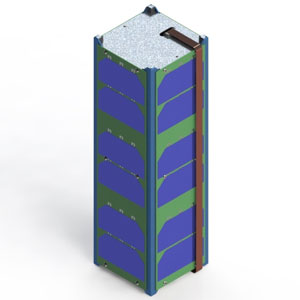
Algeria’s AlSat-Nano is being readied for launch sometime between late August and early September 2016 from the Indian Space Research Organisation’s (ISRO) Satish Dhawan Space Centre, in Andhra Pradesh on the eastern coast of India.
AlSat-Nano is sharing the launch into orbit on an ISRO Polar Satellite Launch Vehicle (PSLV) with ISRO’s INSAT-3DR, a meteorological satellite that will be inserted into geostationary orbit.
AlSat-Nano was jointly developed by the Algerian Space Agency – ASAL – and the UK Space Agency for rapid and cost-effective demonstration of new and innovative space technologies.
AlSat-Nano’s payloads include the SpaceMag-PV Boom, the world’s longest retractable CubeSat-compatible boom that will be able to deploy up to 2-metres in length from a volume the size of a cigarette packet. This technology could also form the basis of de-orbiting systems for future missions. The payload also carries a magnetometer, one of the most compact of its class, to carry out measurements of the Earth’s magnetic field. Also on the payload will be RadFET radiation monitors, and test tokens of a revolutionary flexible solar cell material. The payload is led by Oxford Space Systems Ltd, collaborating with partners including RAL Space and Bartington Instruments Ltd.
Also on board AlSat-Nano is the C3D2 – a customisable camera offering three fields of view and innovative on-board software processing capabilities. The payload will also be a remote experiment of the Open Science Laboratory. The payload development is led by the UK’s Open University Centre for Electronic Imaging with sensor hardware provided by e2v Ltd. and electronics from XCAM Ltd.
Further, Alsat-Nano includes a Thin Film Solar Cell, a novel and potentially step-changing solar cell structure which is directly deposited on cover glass just one-tenth of a millimeter thick. Effects from the space environment will be measured, with the aim of allowing the organisations involved a route to product development and commercial exploitation of this technology. This project is led by the Glyndwr University Centre for Solar Energy Research with contributions from the University of Surrey, Qioptiq Ltd., and Surrey Satellite Technology Ltd.
AlSat-Nano has been designed and built as part of an education programme Surrey Space Centre (SSC) will deliver to Algerian students. The UK Space Agency has funded SSC to design and build the platform hardware and software, and the Algerian Space Agency has undertaken the final assembly and testing, and will conduct the launch and operations with expert guidance from SSC. As part of the mission, approximately one unit of the AlSat-Nano platform has been made available to host self-funded payloads from the UK CubeSat community as a free flight opportunity.
Original published at: http://spacewatchme.com/2016/08/algerias-alsat-nano-prepared-early-september-launch-india/
 SpaceWatch.Global An independent perspective on space
SpaceWatch.Global An independent perspective on space

